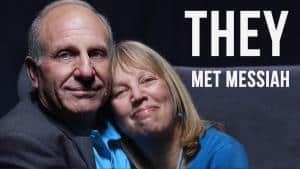Torah Portion for week 7: Genesis 28:10 – 32:3
וַיֵּצֵא
VaYetze (And he went out)
The marvelous Torah portion before us details Jacob's journey of faith with God and God's faithfulness to his promises and the covenant with Abraham. It also portrays a wonderful and prophetic vision which clearly points us to the Messiah. We will focus on Jacob's first dream, which is often referred to as Jacob's ladder, or stairway to heaven – the original one. Let's read Genesis 28:12-17:
And he dreamed, and behold, there was a ladder set up on the earth, and the top of it reached to heaven. And behold, the angels of God were ascending and descending on it! And behold, the LORD stood above it and said, “I am the LORD, the God of Abraham your father and the God of Isaac. The land on which you lie I will give to you and to your offspring. Your offspring shall be like the dust of the earth, and you shall spread abroad to the west and to the east and to the north and to the south, and in you and your offspring shall all the families of the earth be blessed. Behold, I am with you and will keep you wherever you go, and will bring you back to this land. For I will not leave you until I have done what I have promised you.” Then Jacob awoke from his sleep and said, “Surely the LORD is in this place, and I did not know it.” And he was afraid and said, “How awesome is this place! This is none other than the house of God, and this is the gate of heaven.”
We see meaningful and striking parallels between Jacob's journey of faith and that of his grandfather, Abraham. First, both left their father’s house. Second, both made their first stop at Bethel where God spoke to them. Third, God promised the Abrahamic blessings to both at Bethel.
God’s affirmation of the Abrahamic covenant to Jacob is a great encouragement for us – God means what he says. Like Jacob, we serve a faithful God whom we can trust with our lives; we can hold on to his promises! Praise God!
Many interesting interpretations are suggested for the prophetic meaning of the ladder. A theme that permeates early Jewish thought is that the ladder is a form of communication between the heavens (and God's Shechinah glory himself) and humanity. Most ancient Jewish commentaries understood the ladder as representing the tabernacle or the temple – which through the sacrifices and priesthood connects fallen humans to the holy God.
Interestingly, in the Gospel of John, chapter 1, a “true Israelite” (Nathaniel) comes to seek the Messiah. To Nathaniel's sincere seeking, Yeshua said, “Truly, truly, I say to you, you will see heaven opened, and the angels of God ascending and descending on the Son of Man” (Jn 1:51, emphasis added). Yeshua's words here make a clear connection to Jacob's ladder. So, Yeshua's response clearly affirms the general Jewish understanding of Jacob's ladder – indeed, it is symbolizing a connection between heaven and earth. But it does not merely point to the tabernacle or temple. No. Yeshua said it points to him! He is the ladder, the connection, the meeting point, between the Holy God and fallen humans. The Messiah is the one who, descending from heaven, took the form of flesh and sacrificed himself for our sins; and he is the one who also rose from the dead and is now at the right hand of the Father as our high priest, thus ascending to heaven!
Yeshua is the fulfillment of Jacob's ladder; indeed, he is the heart and meaning of all the Torah. That is why he said, “If you believed Moses, you would believe me!” (Jn 5:46, emphasis added.)





















